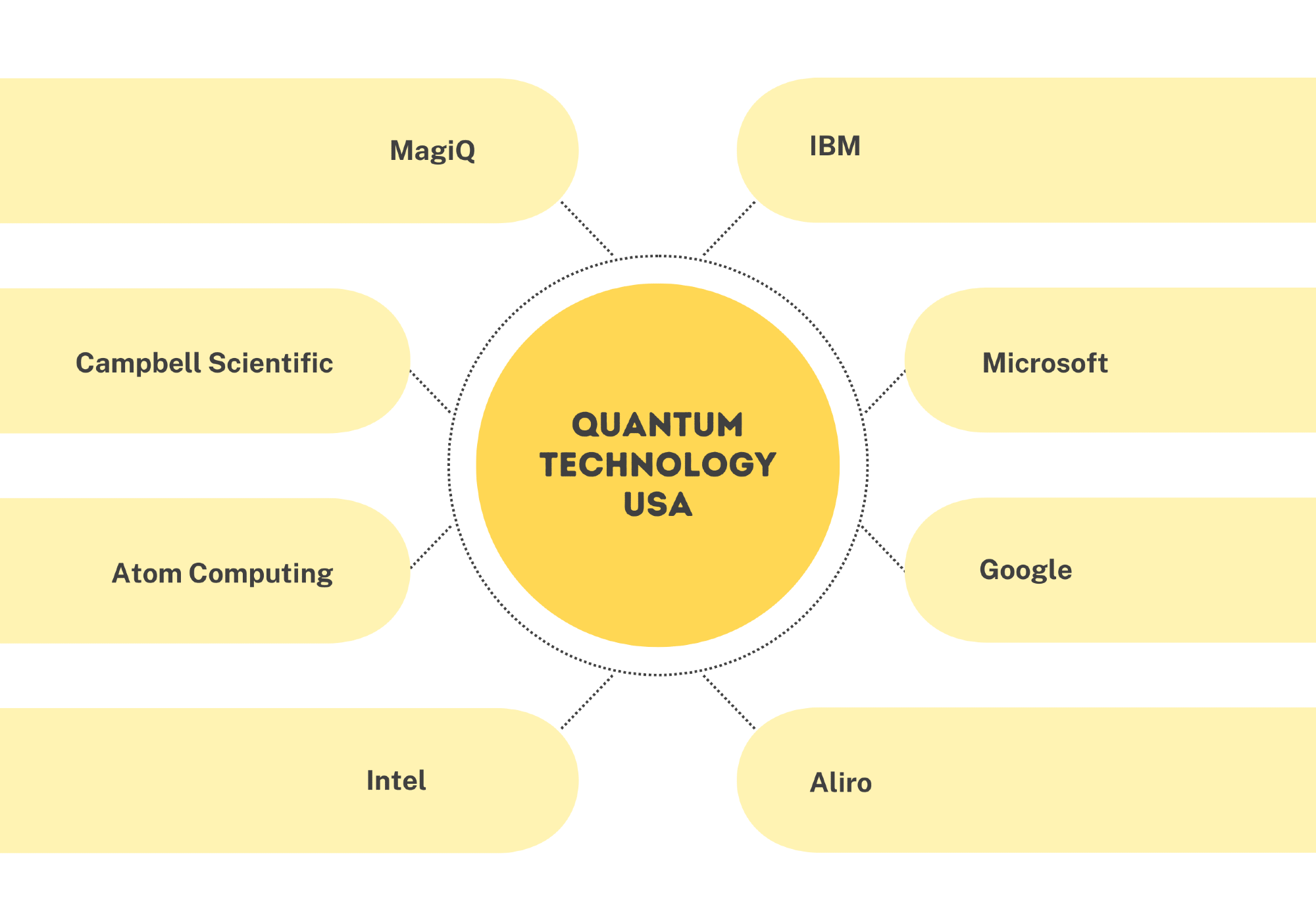 By Joe PicklesNov 4 2022
By Joe PicklesNov 4 2022
As research into quantum computing and other quantum technologies picks up pace, the USA is establishing itself as a leader in the field. Silicon Valley is already a center for classical computing, and many of the companies based there have turned their attention to the exciting prospects of quantum computing. Across the USA, companies, new and old, are entering in to the early quantum technology market.
Federal Investment
Following the successes of quantum research in recent years, the US government has begun investing directly in quantum technology. There are two government organizations dedicated to quantum technology: the National Quantum Initiative (NQI) and the National Institute of Standards and Technology (NIST). The White House has spent almost $1 billion on these organizations in 2022, almost double the investment of 2019.1 While this is still only a small proportion of the USA’s spending on all fields of research, the increase is welcomed by the many companies looking to develop quantum technology.
The NQI was set up in 2018 and intended to encourage and coordinate research into quantum information science (QIS). QIS is a broad field, though its most direct application is in programming quantum computers. NIST is a far older organization, having promoted innovation for over a century, but only recently has its focus turned to quantum technology. As well as researching QIS, NIST is also working on Quantum Sensors and other potential applications of Quantum Mechanics.
IBM has always been an innovator in computer science, and quantum computing is no exception. Since the conceptual stages in the nineties, the company has shown an interest in the field, and now leads a partnership of around two hundred groups invested in quantum computing. IBM Quantum has numerous high-profile members such as JP Morgan Chase & Co., Samsung, Boeing, and MIT.
Their successes include the first cloud-based quantum computing service, which became the IBM Quantum Experience. It gives the public access to the power of quantum computers, as well as the ability to write code for them. IBM hopes that this will encourage interest and innovation in the sector, by making quantum computing available to more than just best-funded laboratories. IBM Quantum collectively has the most quantum supercomputers in the world and is constantly looking to expand or upgrade this fleet.
In 2021, Microsoft made its own cloud-based quantum computing service publicly available. Microsoft Azure Quantum, named after its classical predecessor, brought together multiple frontrunners in the field of quantum computing, including developers of hardware and software. This not only gave the public access to diverse types of quantum computers but also programs and toolkits that make coding with quantum computers easier. Companies under the Azure Quantum umbrella include IONQ (specializing in trapped ion systems), Quantum Circuits Inc. (specializing in superconductor systems), and Toshiba (who have researched optimization).

Google is developing its own quantum computer, with the goal of increasing stability and developing quantum AI. To achieve this, Google has produced various superconducting processors and developed CIRQ, an open-source framework for quantum computing. This is yet another tool intended to make quantum computing easier to understand, helping translate classical computer programs into quantum programs.
Google’s focus on quantum AI makes it stand out from other companies working on quantum computing. While others have shown interest in this field, Google is dedicated to making it a reality and develops quantum computers with this purpose in mind. Theoretically, quantum computers are suited for machine learning tasks, as their unique method of processing data can make connections in ways that classical computers never could. While hardware limitations are preventing breakthroughs, Google hopes to build a reliable quantum computer by the end of the decade, and researchers are excited by the prospect of quantum machine learning.
Another Silicon Valley giant, Intel’s aim is to bring quantum computers out of specialized labs and into widespread commercial use. This doesn’t mean a quantum computer in every home, just bringing them to businesses and non-computing laboratories. To achieve this, Intel is working on quantum components that can be mass-produced, so that quantum computers can be constructed much faster. Intel also builds components for the existing quantum systems, tailored to the specific needs of each computer.
Despite being the youngest company in this article, founded just 5 years ago in California, Atom Computing is a promising start-up. Headed by experienced scientists, it seeks to build a quantum computer that uses optically trapped neutral atoms to store information. While this is a rarer basis for a quantum computer, the company believes that this design has the greatest potential for breakthroughs. The company has already achieved a high profile, receiving investment from Lockheed Martin.

Image Credit: Bartlomiej K. Wroblewski/Shutterstock.com
While AT&T is not a computing company like those listed above, it is still investing in quantum computing. Specifically, the company is researching how to get quantum computers to communicate with one another, applying the years of telecommunications expertise it has access to. Currently, quantum computers can only send data in classical form, meaning transferring information between them is of extremely limited use. The “quantum communication” AT&T is investigating to solve this problem is still in its initial stages, but these are the first steps toward what could be a quantum internet.
MagiQ, based in Massachusetts, is notable for being the first company to ever release a product using quantum cryptography, specifically quantum key distribution (QKD). This is one of the oldest quantum technologies, with proofs-of-concept dating back to the 1980s; it should be noted that one doesn’t need a quantum computer to make use of QKD. QKD takes advantage of the fact that quantum information will be disturbed whenever it is observed, allowing parties to transfer data in this way to check for eavesdropping. Since the release of the QKD in 2004, MagiQ has remained dominant in the sector of quantum cryptography and has begun exploring other applications of quantum technology such as sensors.
Quantum computing may be the better-publicized technology, but it is certainly worth paying attention to the field of quantum sensors. One of the biggest names in the space is Campbell Scientific, a Utah-based company that has been producing data acquisition and measurement tools since 1974. For a good few years, Campbell Scientific has been selling quantum sensors designed to enhance their well-established data loggers. These quantum sensors have a level of precision never thought possible and can obtain new information about infrastructure, geology, and the environment.
SCD USA, a company from Colorado whose imaging products have seen use in both commercial and military settings, is now exploring the potential applications of quantum imaging. They only have a few quantum cameras and sensors available currently, but with their dedicated Quantum research team they could soon be prominent in the world of quantum tech. Their products are designed for Short-Wave Infra-Red imaging, applying quantum mechanics to overcome noise.
Aliro spun out from NarangLab at Harvard University, headed by Prineha Narang. Aliro is delivering a software platform for running and managing quantum networks through its ‘quantum entanglement as a service' (EaaS). You can read our interview with Jim Ricotta, CEO of Aliro, at the link below:
Creating Quantum Network Solutions with Aliro
Future Outlook
As with all developing fields, one can never predict when or where a breakthrough will happen, but as interest and investment increase this becomes more and more likely. Many of the companies researching quantum computing are optimistic, with Microsoft hoping to have developed a “useful” Quantum Computer as soon as 2030. More US universities are also introducing courses on quantum computing, which should bring a wave of talent to fuel the industry. Examples such as MagiQ show the potential for new companies to become forces to be reckoned with in quantum technology, and successes like theirs will inspire more start-ups to pursue quantum innovations. Many established companies are setting up dedicated quantum departments, ready to embrace whatever breakthroughs come in the field of quantum tech.
References
Gross, N. (2022) Where Is Quantum Technology Going in the Federal Government? FedTech. https://fedtechmagazine.com/article/2022/06/where-quantum-technology-going-federal-government
US Government. (2022) National Quantum Initiative. https://www.quantum.gov/
NIST. (2022) Quantum Electromagnetics Division Groups. https://www.nist.gov/org/quantum-electromagnetics-division/groups
IBM. (2022) Quantum. https://www.ibm.com/quantum
Microsoft. (2022) Azure Quantum. https://azure.microsoft.com/en-us/products/quantum/#overview
Google. (2022) Quantum AI. https://quantumai.google/
Porter, J. (2021) Google wants to build a useful quantum computer by 2029. The Verge. https://www.theverge.com/2021/5/19/22443453/google-quantum-computer-2029-decade-commercial-useful-qubits-quantum-transistor
Intel. (2022) Quantum Computing. https://www.intel.com/content/www/us/en/research/quantum-computing.html
Atom Computing. (2022) https://atom-computing.com/
Shankland, S. (2019) AT&T hopes quantum networking will amplify the power of quantum computing. CNET. https://www.cnet.com/tech/computing/att-hopes-quantum-networking-will-amplify-the-power-of-quantum-computing/
MagiQ. (2022) https://www.magiqtech.com/
Campbell Scientific. (2022) About. https://www.campbellsci.com/about
Semi-Conductor Devices USA. (2022) Quantum Imaging. https://scdusa-ir.com/quantum-imaging/
Disclaimer: The views expressed here are those of the author expressed in their private capacity and do not necessarily represent the views of AZoM.com Limited T/A AZoNetwork the owner and operator of this website. This disclaimer forms part of the Terms and conditions of use of this website.